
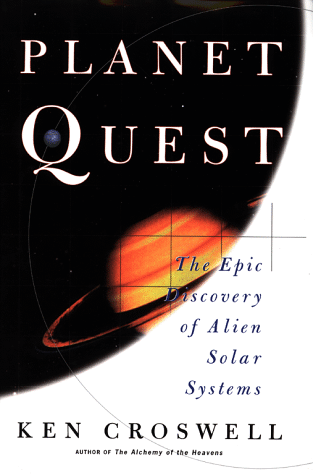
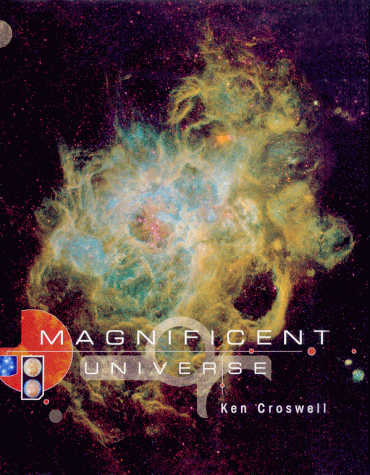

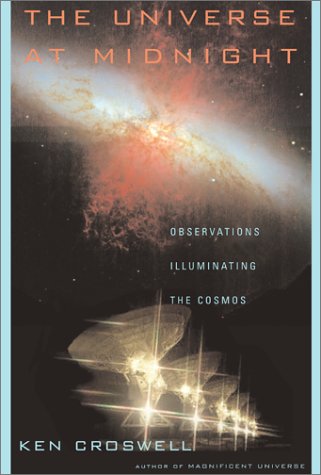
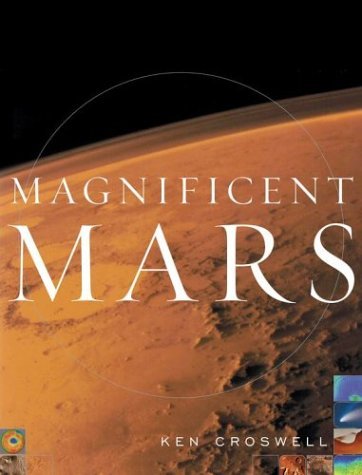
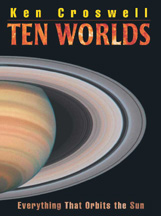

| BOOKS | F. A. Q. | ARTICLES | TALKS | ABOUT KEN | DONATE | BEYOND OUR KEN |
|---|
By Ken Croswell
October 3, 2006

Neptune may develop oceans in 8 billion years. (This image, by Voyager 2, is too blue; see Magnificent Universe or Ten Worlds for a more correct color.)
Even though Neptune abounds with water, no ocean exists beneath its blue-green clouds, say planetary scientists in California. Nevertheless, Neptune may develop an ocean in the far future--after the Sun dies.
Neptune, the eighth planet from the Sun, is named for the god of the sea. The planet is a giant but not a gas giant: whereas the solar system's two gas giants, Jupiter and Saturn, consist mostly of hydrogen and helium, Neptune and its twin Uranus consist mostly of water ice and rock.
Sloane Wiktorowicz and Andrew Ingersoll at the California Institute of Technology in Pasadena constructed models of Neptune's interior and atmosphere. They consulted published models of Neptune's interior that used data from Voyager 2, the only spacecraft to fly past the planet. These models suggest the following composition:
| Hydrogen-helium atmosphere | 2.0 Earth masses |
|---|---|
| Ice (water, methane, ammonia) | 11.4 Earth masses |
| Rock | 3.8 Earth masses |
| Total | 17.2 Earth masses |
Neptune's temperature, at its cloudtops, is -353 degrees Fahrenheit. However, as one proceeds deeper into Neptune, both the temperature and the pressure increase. Furthermore, the water content is greatest in the planet's interior, because gravity causes water to sink through the hydrogen-helium atmosphere.
Wiktorowicz and Ingersoll calculated the abundance of water at different depths. "An ocean could exist only in the atmosphere," says Wiktorowicz, "yet it would require a greater water abundance than we think the interior has." Because the interior does not have enough water, the water vapor content in the air eventually reaches the water content in the interior. As a result, the water does not rain out from the air and create an ocean. Instead, say the scientists, the water-rich air joins directly with the water-rich interior.
 In addition, Neptune is too warm for an ocean, despite the planet's frigid cloudtop temperature. The warmer the planet's air, the more water vapor the air can hold. Because temperature increases with depth, the water vapor content in the air eventually reaches the water content in the interior--so again, there is no rain and no ocean.
In addition, Neptune is too warm for an ocean, despite the planet's frigid cloudtop temperature. The warmer the planet's air, the more water vapor the air can hold. Because temperature increases with depth, the water vapor content in the air eventually reaches the water content in the interior--so again, there is no rain and no ocean.
Oceans are even less likely on the extrasolar Neptunes that astronomers have recently discovered orbiting other stars. These "hot Neptunes" resemble Neptune but orbit close to their stars, so they must be far hotter and thus even less likely to sport oceans, say the scientists.
Still, Wiktorowicz and Ingersoll hold out hope for Neptune's distant future. In 7.8 billion years, the Sun will become a white dwarf. As this Earth-sized star fades, Neptune will receive so little sunlight that the planet will cool. This cooling may cause rain to fall from Neptune's clouds, creating an ocean of liquid water that bubbles with hydrogen gas. However, this ocean would exist not on the planet's surface, as seas on Earth do, but up in Neptune's atmosphere.
The long-range forecast for Neptune puts the chance of rain at about 40 percent. The uncertainty arises because the present amount of water vapor in Neptune's atmosphere is poorly known. If rain does fall, then in 8 billion years an ocean will form and Neptune will finally live up to its namesake.
Wiktorowicz and Ingersoll will publish their study of Neptune in Icarus.
Ken Croswell is an astronomer and the author of Magnificent Universe and Ten Worlds.
"Magnificent Universe by Ken Croswell is elegant and eloquent."--Washington Post. See all reviews of Magnificent Universe here.
"On the basis of its striking design and photographs, this handsome, large-format volume is well worthy of praise. And astronomer Croswell's concise yet conversational, information-packed text wins it sky-high accolades in the narrative sphere as well."--Publishers Weekly, starred review. See all reviews of Ten Worlds here.
| BOOKS | F. A. Q. | ARTICLES | TALKS | ABOUT KEN | DONATE | BEYOND OUR KEN |
|---|